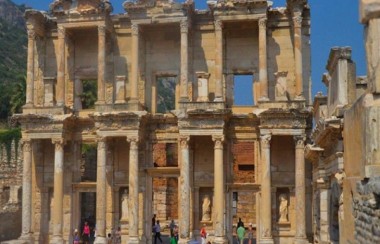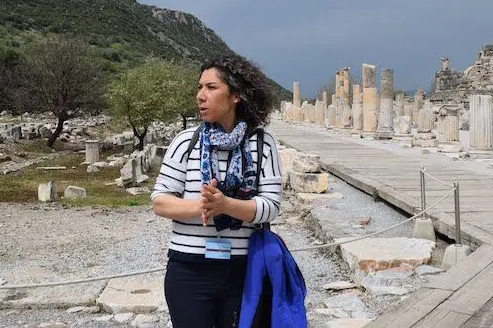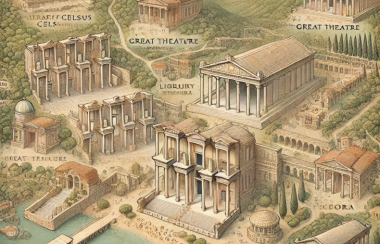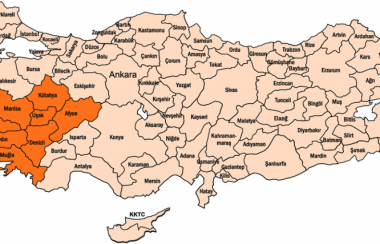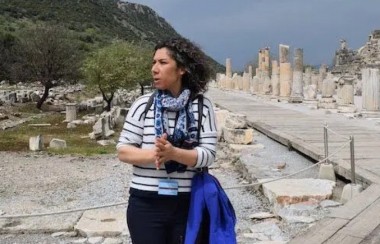1. Historical Overview
- Provide a brief history of Ephesus, from its founding as a Greek colony to its peak during the Roman Empire.
- Mention its importance as a major trade hub and cultural center in the ancient world.
2. Key Attractions in Ephesus
- The Library of Celsus: Highlight its architectural beauty and its historical significance as one of the largest libraries of the ancient world.
- The Great Theatre: Discuss its capacity (25,000 spectators) and its use for gladiatorial contests and theatrical performances.
- The Temple of Artemis: Share details about one of the Seven Wonders of the Ancient World and its ruins.
- The Terrace Houses: Describe the luxurious Roman residences with intricate mosaics and frescoes.
- The Basilica of St. John: Talk about its connection to St. John the Apostle and its historical and religious significance.
3. Cultural Significance
- Write about Ephesus as an early center of Christianity and its mention in the Bible (e.g., the Epistle to the Ephesians).
- Discuss its role in Greco-Roman mythology and its ties to the goddess Artemis.
4. Nearby Attractions
- House of the Virgin Mary: Mention its significance as a pilgrimage site believed to be the last residence of Mary, mother of Jesus.
- The Ephesus Museum: Talk about the artifacts and sculptures found in the city and displayed here.
- The Isa Bey Mosque: Highlight its beautiful architecture and cultural significance.
5. Travel Tips
- Best time to visit Ephesus to avoid crowds and extreme weather (spring and autumn are ideal).
- Information about ticket prices, guided tours, and audio guides.
- Recommendations for comfortable footwear as the site involves a lot of walking on uneven surfaces.
6. Archaeological Importance
- Share insights about ongoing excavations and discoveries.
- Explain how Ephesus provides a glimpse into ancient urban planning and Roman engineering.
7. Local Experiences
- Traditional Turkish Cuisine: Recommend nearby restaurants or food stalls for an authentic dining experience.
- Shopping: Highlight local souvenirs like handmade carpets, ceramics, and Turkish delight.
8. Ephesus in Literature and Media
- Reference how Ephesus has been featured in movies, books, and documentaries.
- Share interesting facts about its inspiration for artists and writers throughout history.
9. Practical Information
- How to get to Ephesus: Closest airport (Izmir Adnan Menderes Airport), transportation options, and tours from nearby cities like Selçuk and Kusadasi.
- Facilities available on-site: Parking, restrooms, cafes, and souvenir shops.
10. Legends and Myths
- Share captivating stories about Artemis, the Temple of Artemis, and the spiritual beliefs surrounding Ephesus.
- Discuss any local legends or folklore tied to the area.
11. Visitor Testimonials
- Include reviews or testimonials from travelers who have visited Ephesus.
- Share unique perspectives or experiences that make Ephesus unforgettable.
12. Photography Tips
- Best spots for capturing iconic images (e.g., Library of Celsus, Great Theatre, sunset views).
- Tips for photographing in different lighting conditions.
13. Sustainability and Preservation
- Discuss efforts to preserve Ephesus as a UNESCO World Heritage Site.
- Explain the importance of responsible tourism and how visitors can help protect the site.
14. Virtual Ephesus
- Suggest online tools or virtual tours for those unable to visit Ephesus in person.
- Include interactive maps or 3D reconstructions of ancient Ephesus.
These additions will make your site more comprehensive, informative, and engaging for readers interested in Ephesus. Let me know if you’d like help expanding on any of these ideas!
Related Services
Private Tour & Transfer Special Services for Guests .
What to Make in Turkey: A Culinary Journey
-
Blog and Article
-
Article
Turkey, a country that bridges Europe and Asia, is a melting pot of cultures, traditions, and culina...
Ephesus is a treasure trove of history
-
Ruins
-
Article
Ephesus is a treasure trove of history, architecture, and culture, and there are many angles you can...
Unleashing the Power of Tourism: Exploring the World's Wonders
-
Blog and Article
-
Article
Unleashing the Power of Tourism: Exploring the World's Wonders
Villas & Vacation Houses For Rent
-
Real Estate
-
Services
Book Your Villa Rental Today!
What to eat in Turkey
-
Blog and Article
-
Article
Turkey has a rich and diverse cuisine that reflects its history and culture. There are many deliciou...
What to drink in Turkey
-
Blog and Article
-
Article
First of all, we would like to tell you about water, which is necessary for the continuation of peop...
Exploring Ephesus: A Guide to the Ancient City Through Its Map
-
Ruins
-
Article
Ephesus, one of the most well-preserved ancient cities in the world, offers visitors an unparalleled...
Aegean Region
-
Region
-
Article
The Aegean region is one of the largest tourism sources in Turkey.
Rent A Gulet In Turkey
-
Yachting
-
Services
Perfect Yacht Charter Experience In Turkey

